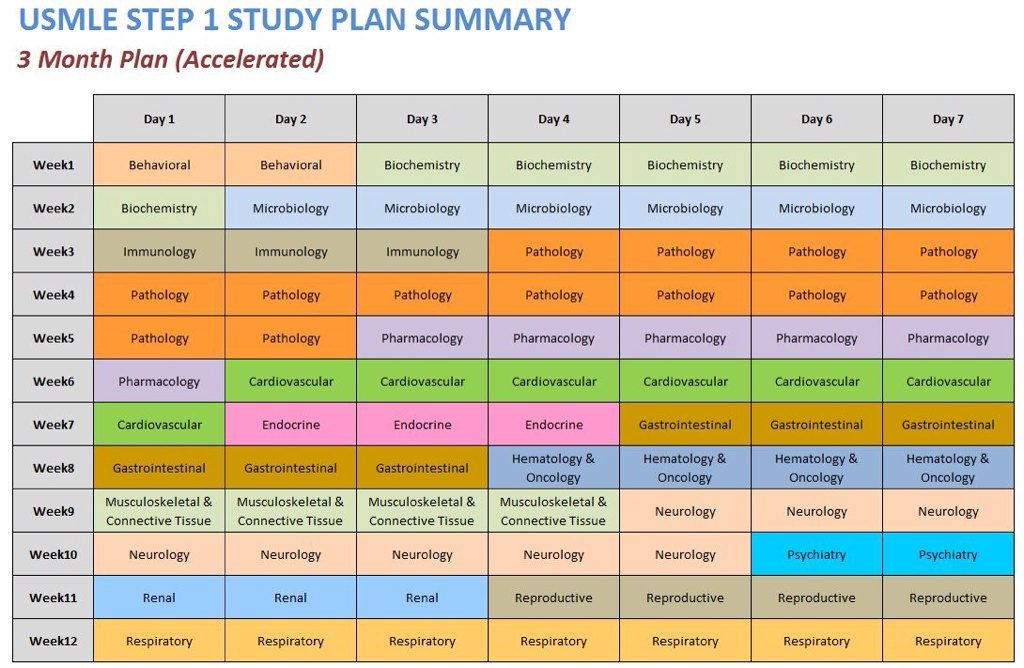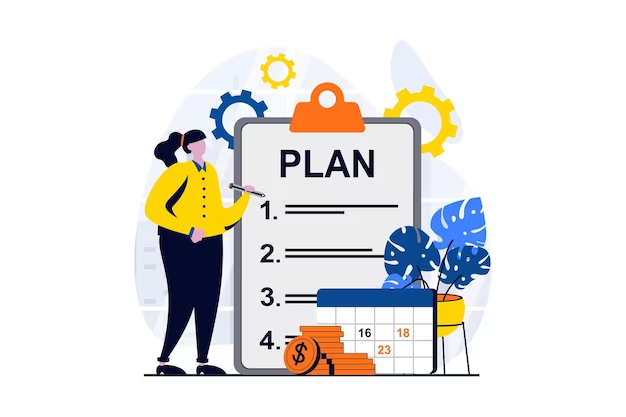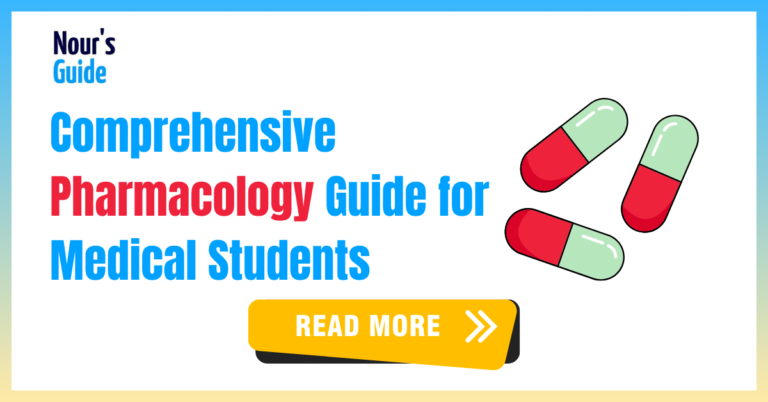Creating an Effective Study Schedule for USMLE Step 1 Exam11 min read
USMLE Step 1 Study Schedule
Preparing for the USMLE Step 1 exam can be a daunting task. With the vast amount of information to cover and the importance of performing well on this exam, it is crucial to have a structured study schedule in place. In this blog post, we will guide you through the process of creating an effective study schedule that will help you succeed in the USMLE Step 1.
Table of Contents
Importance of a Structured Study Schedule
A structured study schedule is essential for several reasons. Firstly, it helps you stay organized and ensures that you cover all the necessary topics within a specific timeframe. Secondly, it allows you to allocate sufficient time to focus on high-yield topics, which are crucial for performing well on the exam. Lastly, a study schedule helps you manage your time effectively, preventing burnout and ensuring a healthy work-life balance.
Key Advice:
- Take a diagnostic exam as soon as possible to assess your starting point
- Don’t compare yourself to others – everyone starts and progresses at different rates
- Take diagnostic tests regularly (every week or 10 days) to track your progress
- Eventually, move away from Anki cards and focus more on resources like UWorld and First Aid
- Keep pushing forward, even when your scores drop – maintain a positive mentality
- Remember that early material will start to be forgotten, so continuously review high-yield notes
- Take breaks and find hobbies to help you manage the high study workload (70+ hours per week)
Assessing Your Current Knowledge
Before creating your study schedule, it is important to assess your current knowledge. This will help you identify your strengths and weaknesses and tailor your study plan accordingly. Take a practice test or review your coursework to gauge your understanding of the material. This assessment will serve as a baseline for your study schedule and allow you to allocate more time to areas where you need improvement.
Determining Your Study Timeline
Once you have assessed your knowledge, it’s time to determine your study timeline. The duration of your study schedule will depend on various factors, including your baseline knowledge, available study time, and exam date. A common recommendation is to allocate at least 8 weeks for dedicated Step 1 preparation. However, this can vary depending on individual circumstances.
Prioritizing High-Yield Topics
As you create your study schedule, it is crucial to prioritize high-yield topics. These are the concepts and subjects that are most frequently tested on the USMLE Step 1 exam. By focusing on these topics, you can maximize your chances of scoring well. Consult reliable resources, such as textbooks and online study guides, to identify the high-yield topics and allocate more study time to them.
Study Approach:
- Study by system (e.g., do all Cardiology videos and questions together)
- Aim for a target score of 70% on practice NBME exams
- The day before the exam, relax and get your materials organized
12-Week Study Plan:
- Week 1-3: Review Pathoma chapters 1-6, do 20 UWorld questions per day
- Week 4: Focus on Cardiology and Psychiatry
- Weeks 5-12: Dedicated study period
- Take diagnostic exams and track progress
- Review systems like GI, Pulmonary, Endocrine, Immunology, Genetics
- Utilize resources like Boards and Beyond, Sketchy Micro/Pharm, First Aid
- See the full Alex’s Plan Here.

3-month plan:

Establishing a Daily Study Routine
- A daily study routine is essential for consistency and productivity.
- Determine the number of hours you can dedicate to studying each day and create a schedule that suits your needs.
- Divide your study time into manageable blocks.
- Include short breaks to prevent burnout.
- Stick to your routine as much as possible.
- Allow for flexibility to accommodate unexpected events or changes in your study plan.
- GPT-4&Web Access
- Add Skills
Effective Time Management Strategies
Time management is crucial when preparing for the USMLE Step 1 exam. To make the most of your study time, consider implementing the following strategies:
- Set specific goals for each study session
- Use a timer or Pomodoro technique to stay focused
- Eliminate distractions, such as social media or unnecessary notifications
- Prioritize difficult topics during your most productive hours
- Break down larger tasks into smaller, more manageable chunks
Optimizing Your Study Environment
Your study environment plays a significant role in your productivity and focus. Create a dedicated study space that is free from distractions and promotes concentration. Ensure that your study area is well-lit, comfortable, and equipped with all the necessary materials, such as textbooks, notebooks, and a computer. Experiment with different study environments to find the one that works best for you.
Active Learning Techniques
Active learning techniques can enhance your understanding and retention of the material. Instead of passively reading or listening to lectures, engage with the content actively. Some effective active learning techniques include:
- Teaching the material to someone else
- Participating in study groups or discussions
- Creating flashcards or mnemonic devices
- Practicing with sample questions and simulations
Incorporating Spaced Repetition
Spaced repetition is a powerful learning technique that involves reviewing information at increasing intervals over time. By spacing out your study sessions and revisiting the material at strategic intervals, you can improve long-term retention and recall. Utilize flashcards or online platforms that incorporate spaced repetition algorithms to optimize your study sessions.
Effective Note-Taking Strategies
Note-taking is an important part of the learning process. Develop effective note-taking strategies that work for you. Consider using visual aids, such as diagrams or concept maps, to organize complex information. Summarize key points in your own words to enhance understanding and retention. Review and revise your notes regularly to reinforce the material.
Leveraging Online Resources
The internet offers a wealth of resources that can supplement your study materials. Explore reputable online platforms, such as educational websites, forums, and video lectures, to gain additional insights and explanations. However, be cautious and prioritize trusted sources to ensure the accuracy and reliability of the information.
Incorporating Physical and Mental Wellness
While studying for the USMLE Step 1 exam, it is crucial to prioritize your physical and mental well-being. Take regular breaks, engage in physical activity, and maintain a balanced diet. Get enough sleep to ensure optimal cognitive function and prevent burnout. Practice stress-management techniques, such as meditation or deep breathing exercises, to stay calm and focused.
Developing Test-Taking Strategies
Test-taking strategies can significantly impact your performance on the USMLE Step 1 exam. Familiarize yourself with the exam format and question types. Practice with sample questions and simulations to develop effective test-taking strategies, such as time management, process of elimination, and strategic guessing. Review your performance and analyze your mistakes to identify areas for improvement.
Monitoring Your Progress
Regularly monitor your progress to ensure that you are on track with your study schedule. Take practice tests or quizzes to assess your knowledge and identify areas that need further attention. Keep a study journal or use online study tracking tools to record your study hours, topics covered, and any challenges or breakthroughs you experience. Adjust your study schedule as needed based on your progress.
Dealing with Burnout and Setbacks
Preparing for the USMLE Step 1 exam can be mentally and emotionally challenging. It is important to recognize the signs of burnout and take steps to prevent it. If you experience setbacks or difficulties, reach out for support from friends, family, or mentors. Consider seeking professional help if needed. Take breaks when necessary and engage in activities that recharge and motivate you.
Effective Collaboration and Peer Learning
Collaborating with peers can enhance your understanding and retention of the material. Join study groups or online forums to discuss concepts, share resources, and clarify doubts. Teaching others can also reinforce your own knowledge and help you identify any gaps in understanding. However, ensure that collaboration does not become a distraction and that you maintain focus on your individual study goals.
Mastering Practice Questions and Simulations
Practice questions and simulations are invaluable resources for exam preparation. Incorporate them into your study schedule to familiarize yourself with the exam format and assess your understanding of the material. Analyze your performance, review the explanations for incorrect answers, and identify areas that require further study. Gradually increase the difficulty level of the practice questions to challenge yourself.
Final Weeks and Exam Day Preparation
In the final weeks leading up to the exam, focus on revision and fine-tuning your knowledge. Review high-yield topics, go through your notes and flashcards, and take timed practice tests to simulate exam conditions. Develop a routine for the day before the exam to ensure that you are well-rested, organized, and mentally prepared. Familiarize yourself with the exam center location and any specific requirements or restrictions.
Final Tips:
- Everything you learn now will set the foundation for 3rd year rotations.
- The knowledge and study habits you develop while preparing for Step 1 will be invaluable as you begin your clinical rotations.
- The material you master now will provide a strong base that you can build upon during your clerkships.
- Approach your Step 1 preparation with the mindset that you are laying the groundwork for your future clinical training and practice.
- Ask for advice from successful upper-class medical students.
2. Reach out to 2nd and 3rd year medical students who have recently gone through the Step 1 experience.
- Learn from their study strategies, time management tips, and lessons learned.
- Getting first-hand insights from those who have been in your shoes can be incredibly helpful.
- Tap into the wisdom and experience of your more senior peers.
3. Have confidence in your knowledge – the Step 1 questions are tricky for a reason.
- Remember that the Step 1 exam is designed to challenge your critical thinking and problem-solving abilities.
- The questions are intentionally structured to test your comprehensive understanding, not just your ability to recall facts.
- Trust that the hard work you’ve put into your studies has equipped you with the necessary knowledge and skills.
- When faced with a difficult question, resist the urge to second-guess yourself – rely on the foundations you’ve built.
- Approach the exam with self-assurance, knowing that you are prepared to succeed.
Conclusion and Key Takeaways
Creating a structured study schedule is crucial for success on the USMLE Step 1 exam. By assessing your knowledge, prioritizing high-yield topics, and implementing effective study strategies, you can optimize your preparation and increase your chances of achieving a high score. Remember to prioritize your physical and mental well-being, seek support when needed, and stay motivated throughout the process. Good luck!
Hiring a USMLE Tutor to design a dedicated study schedule
- Hiring an experienced USMLE tutor can be a valuable investment
- Tutors have often gone through the exam themselves and helped other students
- A tutor can design a personalized study schedule tailored to your needs
- They can assess your baseline knowledge and create a structured plan
- Tutors can help you systematically work through high-yield Step 1 content
- Having an expert guide prevents feeling lost or directionless
- Tutors provide customized feedback and help develop effective strategies
- They can hold you accountable to your study schedule
- While there is an additional cost, the structure and support can be instrumental
- Investing in a USMLE tutor may be worth considering as part of your dedicated study plan
FAQ
Q: Where can I find additional resources for specific subjects?
A: You can find additional resources for specific subjects at the following links:
- Biochemistry Study Guide for Medical Students
- List of the Best USMLE Tutors
- Best Anatomy Resources for Medical Students
- Anatomy Worksheets for Medical Students in PDF
- Cross-Sectional Anatomy Resources
- Anatomy Study Guide for Medical Students
- A Simple Guide to Applying for Electives for IMGs
- USCE for IMGs: A Comprehensive 2024 Guide
- Best Shoes for Clinical Rotations
- How to Make Money Online as a Medical Student
- The Conclusion of Reddit Medical School Anki Posts
Q: Are there any recommended study materials for the USMLE Step 1 exam?
A: Yes, there are several recommended study materials for the USMLE Step 1 exam. Some popular options include First Aid for the USMLE Step 1, Pathoma, SketchyMedical, and UWorld. It is important to find the resources that work best for your learning style and preferences.
Q: How can I avoid burnout during my study period?
A: To avoid burnout during your study period, it is important to prioritize self-care. Take regular breaks, engage in activities that you enjoy, and maintain a healthy work-life balance. Listen to your body and mind, and seek support from friends, family, or professionals if needed.








